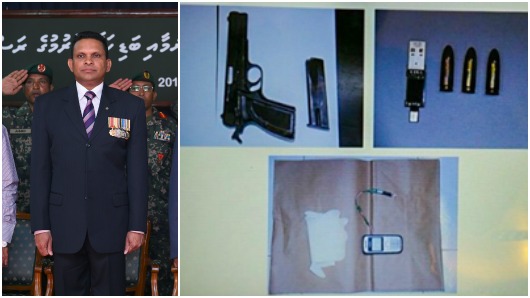Evidence against former Defence Minister Mohamed Nazim consists only of statements by 13 anonymised police officers, defence lawyers claimed last night.
At a second hearing into an illegal weapons charge, Nazim’s lawyers insisted evidence had been fabricated, and asked the Criminal Court’s three-judge panel to examine the legality of the means used to obtain evidence.
Nazim was charged with illegal weapons possession after police raided the then-defence minister’s apartment on January 18 and discovered a pistol and three bullets in a bedside drawer. Nazim was subsequently dismissed from the cabinet and arrested on additional charges of treason and terrorism.
Nazim’s lawyer Maumoon Hameed said some of the police statements were dated a year back, and argued anonymised witnesses would obstruct Nazim’s right to a free and fair trial as it would be impossible for the defence to determine if the officer had in fact been present on the scene during the raid.
But presiding Judge Abdul Bari Yoosuf told Hameed to focus on the content of the statements, and suggested judges would determine the authenticity of the witnesses.
Meanwhile, state prosecutors claimed it was necessary to anonymise witnesses to ensure their safety.
Major blunders
Hameed also pointed to what he called major blunders by state prosecutors, including a decision to withdraw charges against Nazim’s wife during the first hearing, allegedly in light of new information found in a pen drive confiscated during the raid.
According to prosecutors, the documents show Nazim was conspiring with opposition Jumhooree Party Leader Gasim Ibrahim’s Villa group to harm senior government officials.
State prosecutors were also forced to change charges from illegal weapons possession to importing and possessing illegal weapons midway through yesterday’s hearing due to an error in the charge sheet.
Noting that evidence obtained by unlawful means is inadmissible in court, Hameed contended the search warrant issued by Criminal Court Judge Abdulla Mohamed was unlawful.
Station Inspector Ahmed Azmath Abdulla had obtained the warrant on his superior’s orders, not on information he had received, Hameed said.
Further, there had been no police intelligence reports on the presence of illegal weapons at Nazim’s apartment, he alleged.
Police must scrutinise and verify information before obtaining a warrant that violates a citizen’s privacy, he added.
The bench, however, pointed to a High Court ruling in which the appellate court said it could not rule on the legality of the search warrant as the case was ongoing at the Criminal Court.
Hameed noted the High Court’s ruling ordered the Criminal Court to rule on the warrant’s legality during the trial. Judge Yoosuf said the defence’s request had been noted and asked Hameed to speak on the evidence itself.
Hameed also asked for an open and public trial in a larger hall, saying Nazim had no confidence in Prosecutor General Muhthaz Muhsin.
But judges said the trial was already public as media and members of the public were allowed to observe hearings. Ten reporters and ten members of the public were allowed into the courtroom.
Evidence
Hameed asked the state to provide additional information, including a video recording of the raid, forensic analysis reports, copies of data obtained from the pen drive, copies of the forms submitted to the Criminal Court to obtain the search warrant, statements by all police officers during the investigation, video recordings of interviews with Nazim, his family and his security officers, and lists of police officers on duty on the night of the raid.
The extensive list was necessary to determine if the evidence had been fabricated, he said.
State prosecutors said they would issue the requested documents upon further review.
Nazim’s family in a statement last week urged the international community to step up pressure on President Yameen’s administration, claiming “there is no hope that Nazim can expect a fair trial” due to a “notoriously politicised judiciary.”
“Nazim never expected to be where he is now. But he has fallen foul of a political conspiracy, one in which powerful forces within the Maldivian government have sought to destroy him and thus prevent him from challenging for the leadership of the ruling party,” Nazim’s family explained in a letter to the international community.
The Maldives Police Services have denied planting evidence and framing the former minister, insisting officers had acted professionally during the midnight raid.
The government has maintained the arrests and charges against Nazim demonstrate “no one is above the law,” and says it has no influence over the trial, claiming charges were initiated by an independent Prosecutor General and tried through an impartial judiciary.
Related to this story:
Ex-Defence Minister calls for an open, public trial
No hope for fair trial, says former defense minister’s family
Nazim accused of conspiring with Villa group to harm state officials
Ex defense minister’s wife charged with illegal weapons possession
Nazim remains in custody as High Court rejects appeal
Former Defence Minister Nazim remanded for 15 days
Police deny framing Nazim as former Commissioner alleges politicisation
No forensic evidence against Nazim, says legal team
Likes (1)Dislikes
(1)Dislikes (0)
(0) 